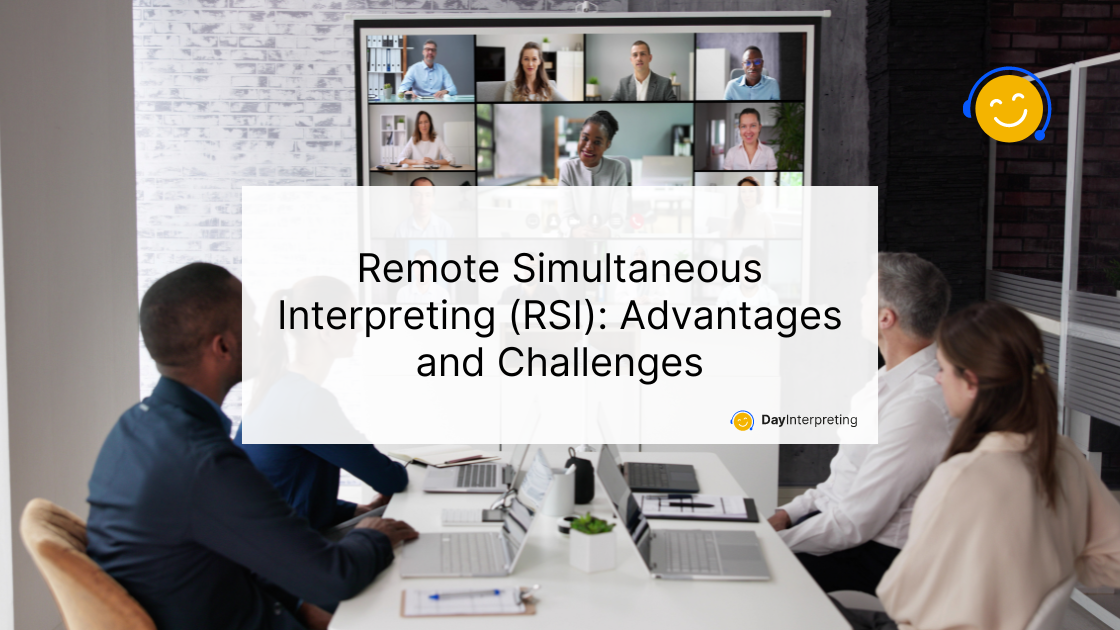Remote Simultaneous Interpreting (RSI) is an amazing technology that allows interpreters to work from anywhere in the world, providing real-time translation during conferences, meetings, and events. But like any technology, RSI comes with its own set of advantages and challenges. Let’s dive into what makes RSI great and some of the hurdles it faces.
What is Remote Simultaneous Interpreting (RSI)?
Before we explore the pros and cons, let’s understand what RSI is. Imagine you’re watching a live event in a foreign language. With RSI, interpreters listen to the speaker through headphones and instantly translate the speech into another language. This translation is broadcasted to listeners who need it, all happening in real time. It’s like having a multilingual superhero team ready to help you understand everything, no matter what language is being spoken!
Advantages of Remote Simultaneous Interpreting
1. Accessibility and Flexibility
One of the biggest advantages of RSI is its accessibility. Interpreters can work from anywhere with an internet connection. This means they don’t have to travel to the event location, saving time and money. It also means that events can have access to a wider pool of talented interpreters from around the globe.
2. Cost-Effective
Since there’s no need for interpreters to travel, RSI can significantly reduce costs. There are no expenses for flights, hotels, or per diems. Plus, organizations don’t have to worry about setting up expensive interpreting booths at the venue.
3. Environmental Impact
With fewer people traveling, RSI helps reduce the carbon footprint of events. This is a great benefit for the environment, making RSI a more sustainable option for global gatherings.
4. Real-Time Translation
RSI provides real-time translation, making it ideal for live events where immediate understanding is crucial. Participants can follow along without missing a beat, making communication seamless and effective.
Challenges of Remote Simultaneous Interpreting
1. Technology Dependence
RSI heavily relies on technology. This means a stable internet connection, high-quality microphones, and reliable software are all essential. If any part of the technology fails, it can disrupt the interpreting process and create confusion during the event.
2. Sound Quality
Sound quality is crucial for effective interpreting. Poor audio can make it difficult for interpreters to accurately translate what is being said. Background noise, echo, or low-quality microphones can all impact the clarity of the interpretation.
3. Technical Issues
Even with the best technology, technical issues can arise. Internet outages, software glitches, or hardware malfunctions can all pose challenges. These technical problems can cause delays or interruptions, affecting the flow of the event.
4. Interpreter Fatigue
RSI requires intense concentration from interpreters, as they have to listen, translate, and speak simultaneously without delay. This can be mentally exhausting, especially for long events. Ensuring interpreters have breaks and support is crucial to maintain high-quality interpretation.
Overcoming Remote Simultaneous Interpreting Challenges
1. Investing in Quality Equipment
Investing in high-quality equipment is key to overcoming technology dependence. This includes reliable internet connections, professional-grade microphones, and robust interpreting software. Quality equipment ensures smooth and uninterrupted interpretation.
2. Providing Technical Support
Having a dedicated technical support team can help resolve any issues quickly. This team can monitor the event, troubleshoot problems, and assist interpreters with any technical difficulties that arise.
3. Soundproofing and Quiet Environments
For the best sound quality, interpreters should work in soundproof or quiet environments. This minimizes background noise and ensures clear audio. Encouraging event participants to use good microphones and reduce background noise also helps improve sound quality.
4. Rotating Interpreters
To address interpreter fatigue, events should have multiple interpreters who can take turns. This allows interpreters to rest and stay alert, maintaining the quality of their translation throughout the event.
The Future of Remote Simultaneous Interpreting
The future of RSI looks bright as technology continues to advance. Improved internet speeds, better audio equipment, and more sophisticated interpreting software will make RSI even more efficient and reliable. As the world becomes more connected, RSI will play a crucial role in bridging language gaps and fostering global communication.
Remote Simultaneous Interpreting (RSI) offers incredible advantages, making events more accessible, cost-effective, and environmentally friendly. However, it also comes with challenges that need to be addressed to ensure smooth and effective interpretation. By investing in quality equipment, providing technical support, ensuring good sound quality, and rotating interpreters, we can overcome these challenges and make the most of RSI’s potential. As technology evolves, RSI will continue to revolutionize the way we communicate across languages, bringing the world closer together.





0 Comments